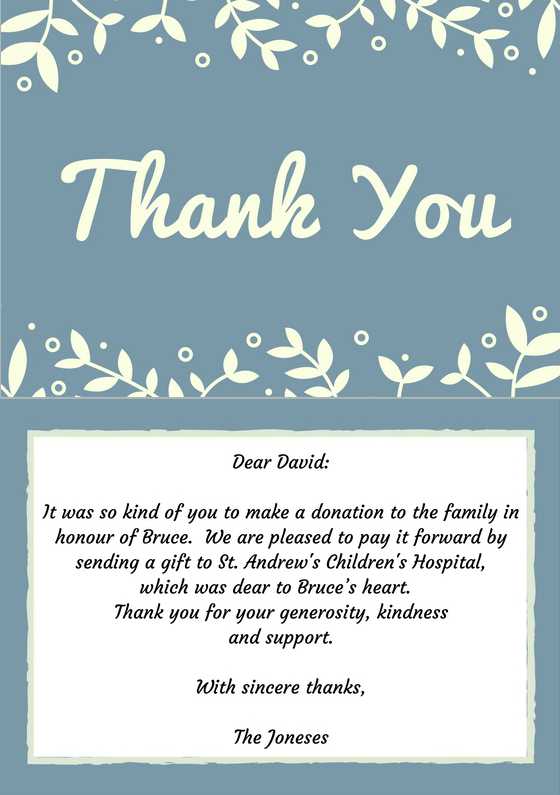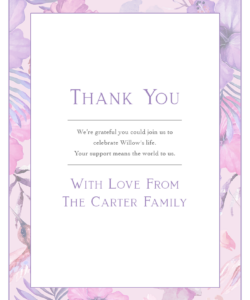In the difficult period following the loss of a loved one, the outpouring of support from friends, family, and community can be a profound source of comfort. These gestures, whether big or small, are a testament to the love and respect people held for the deceased, and often, for you and your family as well. It’s a time when you might feel overwhelmed by grief, yet still touched by the kindness extended.
Navigating the immediate aftermath of a funeral involves many tasks, and expressing gratitude for the thoughtfulness shown is one of them. While it might seem like a daunting item on an already long list, acknowledging these acts of compassion can be a healing step. It allows you to pause and reflect on the connections that truly matter, reinforcing the bonds of support around you.
This article aims to ease that particular burden by offering guidance and inspiration for crafting sincere thank you messages. We understand that finding the right words can be challenging during such an emotional time, so we’re here to help you articulate your appreciation effectively and with genuine sentiment, making the process of writing funeral gift thank you wording a little less stressful.
Navigating Gratitude Amidst Grief: Why Thank You Notes Matter
The days and weeks after a funeral are a blur of emotions, memories, and often, practical arrangements. Amidst this whirlwind, the thoughtful gestures from others stand out, whether it’s a beautifully arranged floral tribute, a comforting casserole, a generous donation in the loved one’s name, or simply their warm presence and kind words. These acts of sympathy and support are not just polite gestures; they are vital lifelines that help carry a grieving family through their darkest hours. Recognizing and appreciating these efforts becomes an important part of the healing process, both for the givers and the receivers.
Sending a thank you note goes beyond mere etiquette; it is a heartfelt acknowledgement that their care made a difference. It closes a loop of communication, letting people know their efforts were seen and valued, even when you might not have had the capacity to express it fully in the moment. For many, it provides a sense of closure, assuring them that their contribution brought comfort and was received with gratitude during a challenging time.

Different forms of support call for slightly different acknowledgements. A donation to a charity in memory of your loved one, for instance, reflects a lasting tribute, while a meal delivered to your doorstep provides immediate, practical relief. A bouquet of flowers offers visual beauty and a reminder of life, and a simple phone call or visit brings invaluable emotional connection. Each gesture, regardless of its form, stems from a place of genuine care and deserves a tailored response that echoes your specific appreciation.
It is perfectly understandable if the thought of writing thank you notes feels overwhelming. There is no strict timeline you must adhere to. The most important thing is to be genuine. You might find it helpful to enlist the help of family members or close friends to assist with addressing envelopes or even to share the writing task. Remember, a short, heartfelt message is always more impactful than a lengthy, generic one. Focus on expressing your sincere appreciation for their specific act of kindness.
These notes also serve to reinforce the enduring relationships you have with those who reached out. In times of sorrow, these connections become even more precious. By acknowledging their support, you strengthen these bonds, creating a foundation of shared memories and continued care. It’s a quiet way to say, “thank you for being there when it mattered most,” ensuring that their compassion is not only felt but also remembered.
Thoughtful Examples for Your Funeral Gift Thank You Wording
Crafting the perfect message doesn’t have to be difficult. Here are some ideas and templates for funeral gift thank you wording that you can adapt to fit your specific situation and relationship with the recipient:
- For a general expression of sympathy and support: “Thank you for your kindness during this difficult time. Your support has meant so much to our family.”
- For flowers: “We deeply appreciate the beautiful flowers you sent in memory of [Deceased’s Name]. They brought much comfort and light to the service.”
- For a charitable donation: “Thank you for your generous donation to [Charity Name] in memory of [Deceased’s Name]. It is a truly meaningful way to honor their life and legacy.”
- For bringing food or a meal: “Your thoughtful meal was such a comfort during this overwhelming time. We are so grateful for your kindness and practical support.”
- For practical help or assistance: “We truly appreciate you [mention specific help, e.g., ‘watching the children’ or ‘helping with arrangements’]. Your assistance was invaluable and we are so grateful.”
- For attending the service and offering condolences: “Thank you for being there for us at [Deceased’s Name]’s service. Your presence and kind words were a great source of comfort.”
- For a shared memory or anecdote: “Thank you for sharing your wonderful memory of [Deceased’s Name]. It brought a smile to our faces to recall [specific detail of memory].”
- For a Mass card or spiritual offering: “Thank you for the thoughtful Mass card in memory of [Deceased’s Name]. Your prayers and spiritual support are deeply cherished.”
- For a specific gift (e.g., a photo album, book): “We were so touched by the beautiful [gift name] you gave in memory of [Deceased’s Name]. It is a precious keepsake we will treasure.”
- From a group of family members: “On behalf of the entire [Family Name] family, we extend our heartfelt gratitude for your sympathy and support during our time of loss.”
- For someone who traveled a long distance: “We truly appreciate you traveling all that way to be with us and honor [Deceased’s Name]. It meant the world to have you there.”
- For an ongoing offer of support: “Thank you for your continuous support and for letting us know you are there for us. It is reassuring to know we have you to lean on.”
In times of profound sorrow, the simple act of expressing gratitude can bring a quiet sense of peace. It’s a way to acknowledge the kindness that surrounds you, transforming moments of grief into opportunities for connection and shared humanity. Remember that sincerity and a personal touch are always the most important elements.
Allow yourself the grace and time needed to complete this task. There is no right or wrong way to grieve, and there is no strict deadline for showing your appreciation. The effort itself, when it comes from the heart, will be deeply felt and understood by those who cared enough to reach out.


